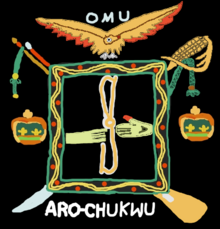


Flag of the Aro Confederacy
| |
| Total population | |
|---|---|
| Upwards of 1.1 million | |
| Regions with significant populations | |
| Nigeria | |
| Languages | |
| Igbo, Ibibio, Cross River languages, English | |
| Religion | |
| Christianity, Traditional | |
| Related ethnic groups | |
| Ibibio, Efik, Ekoi, Bahumono, Ijo, Igala, Idoma, other Igbo peoples |
The Aro peopleorAros are an Igbo subgroup[1] that originated from the Arochukwu kingdom in present-day Abia state, Nigeria. The Aros can also be found in about 250 other settlements mostly in the Southeastern Nigeria and adjacent areas. The Aros today are classified as Eastern or Cross River Igbos because of their location, mixed origins, culture, and dialect. Their god, Chukwu Abiama, was a key factor in establishing the Aro Confederacy as a regional power in the Niger Delta and Southeastern Nigeria during the 18th and 19th centuries.
The history of the Aros predates Igbo migration and founding of the kingdom of Arochukwu. During the Bantu expansion, a group of Proto Ibibio migrated to the area and established the Mbot Abasi Kingdom. The Proto Ibibio group originally came from Usak Edet (Isanguele), a segment of the Ejagham in present-day Southern Cameroon. Igbo migrations led by Eze Agwu from Abiriba and Nnachi from Edda migrated into the Aro region started in the mid-17th century. These Igbo migrants were resisted by the indigenous proto Ibibios. The Aro-Ibibio Wars and the migration of the Akpa from east of the Cross River, formed the nation during the turning point of the 17th century to the 18th century. The Efik were originally from the Ibom Kingdom and might have left before or during the Aro-Ibibio Wars. The Igbo and Akpa alliance, defeated and assimilated the original Ibibio inhabitants after long years of warfare. By this time, the palm oil and slave trade was popular in the hinterland. By the mid-18th century, there were mass migrations of Aro businessmen to the Igbo hinterland and adjacent areas. This migration, influence of their god Chukwu Abiama through priests, and their military power supported by alliances with several related neighboring Igbo and eastern Cross River militarized states (particularly Ohafia, Abam, Ihechiowa, Abiriba, Nkporo, Afikpo, Ekoi, etc.) quickly established the Aro Confederacy as a regional economic power. However, Aro economic hegemony was threatened by the penetration of Europeans, mainly British colonists towards the end of the 19th century. Tensions finally led to bloodshed, and the Anglo-Aro war took place from 1901 to 1902. The Aro Confederacy stoutly resisted but eventually suffered defeat. This helped the British to occupy the rest of what became Eastern Nigeria.
The Aros have a rich tradition. One factor is the Ekpe society which is a sacred society originally from east of the Cross River. The highly religious and judicial society took a major part in Aro society. The use of the writing system, Nsibidi, was based on secret societies like Ekpe. Uli, another writing system, occurred mostly in the form of body art.
Another factor is the Chukwu Abiama Temple, which was mediated by the Aro priesthood. They influenced neighbors and allies before the British invasion and destruction of the Chukwu Abiama Temple and Aro priesthood. The Ekeleke masquerade activity was important in Aro settlements. Brought from the Aros in the western Niger Delta, it eventually spread to the Oguta area. They also were known for wearing the popular "George" cloth. The Ikperikpe warrior dance was very famous among warriors in the old days and continues to be in use.
|
Igbo topics
| |||||
|---|---|---|---|---|---|
| History (chronological order) |
| ||||
| Subgroups |
| ||||
| Politics |
| ||||
| Geography (Igboland) |
| ||||
| Demographics |
| ||||
| Culture |
| ||||
| Language |
| ||||
| Wikipedia |
| ||||
| |||||
| National |
|
|---|---|
| Other |
|